
Atlas F1 Magazine Writers
Did you know that Jacques Villeneuve has raced the most Grands Prix for Honda after Ayrton Senna? The fact certainly surprised Villeneuve, but these days he will accept an achievement any which way it comes. These are testing times for the former World Champion, with no indications that the future is going to be any better. Atlas F1's David Cameron and Biranit Goren sat down with Villeneuve to hear about frustration, hope and false impressions
The statistics show that Ayrton Senna leads the Honda drivers' table with 93 Grand Prix starts, followed by Villeneuve with 63 starts and Gerhard Berger with 48. Four times World Champion Alain Prost is ninth, with only 32 starts for Honda.
"Well," Villeneuve says, reflecting on the notion of being second only to Senna, "that's something at least."
There doesn't seem like Villeneuve has much to celebrate these days. He remains one of the greatest star attractions in a sport that seems to fill up with cloned drivers; but Villeneuve is having a season to forget, full of frustration and regret - perhaps his worst since he made his debut in Formula One by placing his 1996 Williams on pole position in Melbourne.
The reasons for Villeneuve's lackluster season are varied; mainly, he has suffered reliability problems in too many races, and this has been compounded by his own performances on and off the track. There were too many public feuds between himself and team boss David Richards, as well as a lengthy exchange of insults with new teammate Jenson Button. Coupled with the second highest salary on the grid a topic for much criticism even within his team - Villeneuve now finds himself in the unenviable position of having no contract for 2004 and with no options left to pursue.
So when you finally get a chance to sit down with Villeneuve for a private interview, the inevitable question is: what is he going to do next year?
"No idea," he says, shrugging. "No idea at all."
Q: The notion in the media is that you are resigned to leave Formula One
Villeneuve: "Oh, no, that's not my plan. Right now there's no contract, there's nothing, that's all but my plan is not to leave."
Q: But what happens if you don't sign a contract? What is your Plan B, so to speak?
Villeneuve: "Well, I want to continue racing, but I don't want to go through another year like this year. If we work something out with BAR then it would only be because everybody has decided to work closely together, so all that happened last winter and at the beginning of the season - which felt like two separate camps fighting - that wouldn't happen anymore. It would make life a lot easier, and I would be happy with that. Unless that happens, then there won't be any contract. But right now everybody seems to be positive and we all seem to want to work together, so there shouldn't be any problems."
Q: There doesn't seem to be a lot of other options outside of BAR most of the other teams have firmed up their driver line up. Are you still looking at other teams?
Villeneuve: "No, there's no other option for the 2004 season - every team I think is blocked for next year - it's the year after that when everything opens up."
And, it would be sad if Villeneuve's last season in Formula One was to be the season he's enduring in 2003.
"No," he says, smiling wryly, "it hasn't been a great season at all. There's been a lot of frustration this year."
Q: You've had a lot of mechanical problems, but how do you actually rate your own driving this year? Is it hard to know?
Villeneuve: "Well I'm happy with my driving; it's just I didn't have enough laps to really show it too many times the car broke down on lap seven or whatever of a race, and I think the perception is a lot more negative than the reality. The perception is that I've been slower than Jenson in qualifying, when out of all the races it's seven to five in my favour in qualifying.
"So the perception is totally wrong, and I've always been running with the same or more fuel load, but that's also something that cannot be seen because people look at a piece of paper and that's it, and the reality doesn't matter. So the perception is not helping, and I'm at a point where the good things won't be perceived, only if something bad happens that's what people will notice, so that makes it a little bit difficult."
Q: I must say I'm surprised; I never thought you'd be the type of person who would care about perceptions
Villeneuve smiles again; this interview will have a lot of wry smiles, it seems. "Well," he responds, "when it means you're getting a contract or you're out - then yes, you start caring."
But 2003 isn't the first frustrating season Villeneuve has had to endure in Formula One, and in BAR in particular. When he left Williams at the end of 1998 to join the newly formed BAR built on the ashes of Tyrrell by his manager Pollock, with the financial backing of British American Tobacco there were many promises of podiums and even a daring suggestion of a win on the debut race of the team. The reality was a year so terrible, so marred with mechanical breakdowns, that the team ended eleventh and last in the Constructors' Championship. Yes, even behind Minardi.
Yet 2003, Villeneuve says, is harder to endure than the 1999 season.
Q: Did it also help knowing that 1999 was a learning year for pretty much everyone in the team?
Villeneuve: "1999 was a slap in the face but that's fine, you know, it's like cold water in the morning, that fine."
Q: Was it really worse than you expected?
Villeneuve: "Oh, yes. You know, everyone thought that we'd be fighting for podiums
so yeah, that was just a slap in the face. But okay, fine, we've just got to get back in the room and work it out then that's fine. This year, though, has been more like a survival battle, which is never nice."
Q: It sounds like it's a personal survival battle, rather than for the whole team you separate yourself
Villeneuve: "Well that's how it felt this year, and that's why it was more difficult, and it's a shame because it's not with the engineers or the mechanics I work with we've always been a really tight group and there's no problem there. But whatever happens with me, the team will go on, so it has separated somehow and that has made it more difficult."
Q: There's something I can't figure out. If 99 was a slap in the face, then why did you stay in BAR after that?
Villeneuve: "Well I had a contract for the following year, but more importantly Honda joined and they asked me to stay. They told me to stay at the end of 2000."
Q: So what about now? Do Honda want you to stay?
Villeneuve smirks. "Well they've been a lot less vocal this time than they were at the end of 2000!"
"Well, here at the track with the engineers it works really well," Villeneuve explains.
"It takes a while to build relationships, and the first couple of years there was a tendency to change engineers every six months so it was impossible to build a relationship, but in the last year it's calmed down a little bit so it made everything easier the relationship is good now."
Q: But how do you build a relationship with a major motor manufacturer such as Honda?
Villeneuve: "You just work it's nothing that is forced. Unless you have to work with someone then no you're not inviting them to sit down and have coffee, you're working with them and that's when it builds, when the trust starts building up, and without it you can't work.
Q: I guess most of that would be in the testing periods, away from the races?
Villeneuve: "Testing, but racing is where there's more tension, so that's where anything you build will be stronger; the pressure just brings everybody together."
Q: Well I know for a fact that Honda rate you very highly as far as technical input goes
Villeneuve: "Oh, really?"
Q: Or so they say
But I am curious what makes a driver good at technical input. What would make you good at it?
Villeneuve: "Talking about a car, setting up a car - what direction should be taken for development - and the same thing for the engine. It's never something that is clear cut it's always a little bit of a feel, and sometimes you're not even sure if you felt it, or you kind of think you did and then you have to evolve on that, and then you have to start thinking on it, and to make it real.
Q: When you say you feel it, how does that manifest itself? You're going down a straight and maybe the engine's lagging a little bit, or
Villeneuve: "Engine is more than power - it's weight, it's how the car reacts with the engine, it's how you can drive it, where the power comes; when it comes; the drivability, and all that. And - mostly now with traction control and all the driver aids - it's become much more difficult to understand what the engine is doing. So the feel work you do has become more important. And often the new development direction you will take is just an idea - it's not something that's been tested, it's more a matter of instinct.
"Going quicker around the lap is not just having more horsepower; sometimes it can be an engine that has a little bit less horsepower but is lighter, or is easier to drive, and so on. And that's what is difficult for an engine manufacturer to understand, because all they understand is the engine. And it takes a while, but right now the relationship has been going on long enough that we can actually kind of involve every aspect of the race car together.
"But, it doesn't happen in five laps, because you always try to work around problems by changing set ups on the car, by changing anything you can actually change, because once you have an engine you can't change it - you can't just take the hood off and do a few tweaks and now suddenly it's lighter or the characteristics are different.
"So it takes a while, and once you've been on the limit and doing laps - thousands of laps! - and changing set ups and all that, you just wrack your brain to find out how you could gain one tenth of a second, and that's when you start working on that side a lot more."
Q: Do you feel you have an impact on the engine that they'll manufacture later?
Villeneuve: "Yeah the engine we have now has already been influenced by what we've done since the beginning of the season, by what I thought was needed - not enough to my taste of course, but everybody's like that!
"But yes, it has been influenced, and it's been going in what I think is the right direction, so I'm very happy."
But Jacques, more the Gilles, has made a name for himself as an eccentric, anti PR driver who says what he wants when he wants it. He is a character, alright, which perhaps suggests that Villeneuve junior is simply in Formula One at the wrong time, that he'd have been more suitable for the Formula One of the late seventies alongside characters like James Hunt Niki Lauda?
"No, because everybody was like that!" he laughs aloud.
"Oh, I don't know," he adds later. "I don't think I would have survived the seventies because I like taking risks, and back then you paid a much higher price for the risks you took, so I'm not sure actually I would have lived through them."
Q: But do you like Formula One now?
"I like driving," he says, without giving it a thought. "But that's all."
Jacques Villeneuve is surprised to hear he is the longest running Honda driver after Ayrton Senna. "Really?" the 1997 World Champion says. "I didn't know that. What Prost didn't stay that long?"
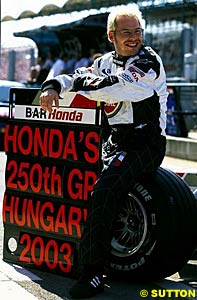 Yet Villeneuve has a point: most people would associate Prost with Honda before they would associate the Canadian with the Japanese carmaker. Perhaps because Prost won 11 of those 32 races for Honda, while Villeneuve driving with Honda since they re-entered Formula One in 2000 has merely two podiums to show for in double the race starts.
Yet Villeneuve has a point: most people would associate Prost with Honda before they would associate the Canadian with the Japanese carmaker. Perhaps because Prost won 11 of those 32 races for Honda, while Villeneuve driving with Honda since they re-entered Formula One in 2000 has merely two podiums to show for in double the race starts.
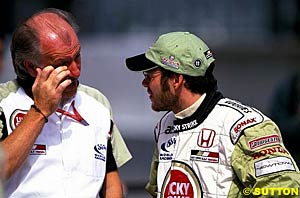 Inevitably, then, Villeneuve just needs to make it through the next season, and it won't be before next weekend at the earliest that he will find out if BAR want to retain his services for 2004 or not. If he leaves, it would be a bitter ending to what initially promised to be Villeneuve's Dream Team with his manager Craig Pollock and his loyal race engineer Jock Clear working with him, for him.
Inevitably, then, Villeneuve just needs to make it through the next season, and it won't be before next weekend at the earliest that he will find out if BAR want to retain his services for 2004 or not. If he leaves, it would be a bitter ending to what initially promised to be Villeneuve's Dream Team with his manager Craig Pollock and his loyal race engineer Jock Clear working with him, for him.
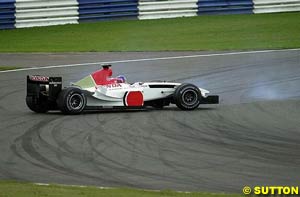 "1999 was a frustration," he explains, "but at the same time there was a contract for the year after, and there were no problems with the team from the beginning. Now with the team everything seems to be right, but there have been moments in the winter and all that and last year where it didn't seem that a faction - a part of the team - was behind me, and that made it worse. Also, in 1999, when things went bad - it was bad for all of us together. So it was frustrating, but we could all take it together. So that was okay. But this year it felt like things have gone wrong and you know I've been carrying most of it, so that makes it more difficult."
"1999 was a frustration," he explains, "but at the same time there was a contract for the year after, and there were no problems with the team from the beginning. Now with the team everything seems to be right, but there have been moments in the winter and all that and last year where it didn't seem that a faction - a part of the team - was behind me, and that made it worse. Also, in 1999, when things went bad - it was bad for all of us together. So it was frustrating, but we could all take it together. So that was okay. But this year it felt like things have gone wrong and you know I've been carrying most of it, so that makes it more difficult."
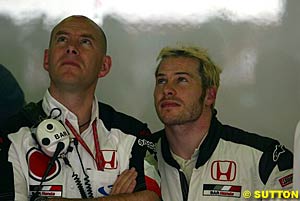 Villeneuve's relationship with Honda may not be as close-knit as the one Ayrton Senna formed with the engine manufacturer the Brazilian World Champion was treated like a son by the Honda executives of the day but there is no other current driver Honda trust as much as Villeneuve's. The engineers say his technical input is superb, and he seems to have gelled in well with the Japanese staff that settled in England.
Villeneuve's relationship with Honda may not be as close-knit as the one Ayrton Senna formed with the engine manufacturer the Brazilian World Champion was treated like a son by the Honda executives of the day but there is no other current driver Honda trust as much as Villeneuve's. The engineers say his technical input is superb, and he seems to have gelled in well with the Japanese staff that settled in England.
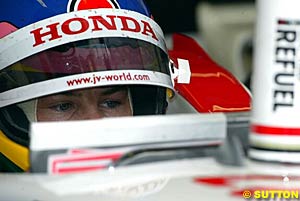 "And so you have to trust your judgment, and it's very easy
you always know what they want you to say, you can see it in their face, and it's very difficult after half an hour of discussions for you to understand if you're saying what they want you to say or if you really believe what should be good for the car and engine and so on. And then you have to prove it's right as well, and that's why it takes time, and the respect seems to be there now."
"And so you have to trust your judgment, and it's very easy
you always know what they want you to say, you can see it in their face, and it's very difficult after half an hour of discussions for you to understand if you're saying what they want you to say or if you really believe what should be good for the car and engine and so on. And then you have to prove it's right as well, and that's why it takes time, and the respect seems to be there now."
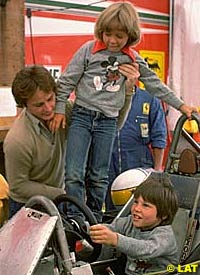 Looking at Villeneuve, a flair of mischief lighting up in his eyes as he talks about engines and cars and going faster and faster, it's hard not to recall the famous picture of a toddler Jacques in a Mickey Mouse sweatshirt, sitting in dad's car. The eyes are Gilles; so are the stubbornness and the individualism.
Looking at Villeneuve, a flair of mischief lighting up in his eyes as he talks about engines and cars and going faster and faster, it's hard not to recall the famous picture of a toddler Jacques in a Mickey Mouse sweatshirt, sitting in dad's car. The eyes are Gilles; so are the stubbornness and the individualism.
Please Contact Us for permission to republish this or any other material from Atlas F1.
|
Volume 9, Issue 36
Honda 250: Special Project
Interview with Jacques Villeneuve
Interview with Shoichi Tanaka
Interview with Jenson Button
House of the Rising Sun
Honda's First: Richie Ginther
Honda Through the Lens
Trading Cards: Honda's Drivers
The Honda Trivia Quiz
Columns
On the Road
Elsewhere in Racing
The Weekly Grapevine
> Homepage |
